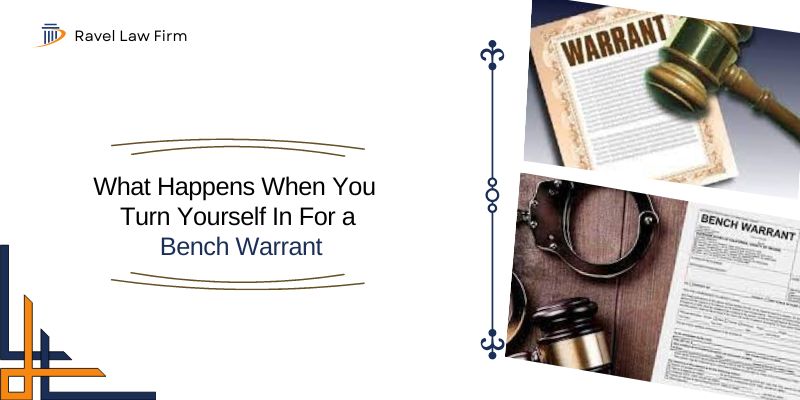The court may grant a bench warrant for your detention if you fail to appear on the charges against you. Many folks need help understanding what’s going on here.
You may have several concerns and questions if you know that a bench warrant has been issued for your arrest. From thinking about the potential implications of skipping the pretrial hearing that led to the warrant to what you should do next, you could be feeling stressed. A few of our clients have inquired, “Do I need an attorney if I turn myself in for a warrant?”

A lawyer is not required in the event of a charge of failure appearing. However, anyone facing legal difficulty should seek the counsel of an experienced criminal defense attorney.
What Does Bench Warrant Means?
A judge can issue an arrest warrant (sometimes called a “bench warrant”) under certain situations. A judge issues a bench warrant if a defendant does not appear in court as required.
The issuance of a bench warrant is a formal order for the local police to arrest you. Eventually, you’ll have to face the judge and explain why you skipped your initial court date.
Contact a criminal defense lawyer immediately if you have missed a court date. They can help you navigate the processes involved in obtaining a bench warrant.
How To Find Out If You Have a Warrant In Your Name?
There are means through which you may determine whether an arrest warrant has been issued for your name. Copies are posted online to alert authorities and the public when a warrant is issued. Suppose you believe that you are the subject of an outstanding arrest warrant. In that case, you may conduct an online search at the court website from which you expect the warrant to have been issued.
Check the website of the state superior court if you need to know what city or county a warrant could be issued from.
A warrant status might be discovered by conducting a criminal history check on oneself. An attorney can help you determine if an arrest warrant has been issued if you cannot do it alone. If that’s the case, they’ll be able to advise you on the best course of action to take to get the warrant removed.
See Also: What Happens If You Have a Warrant for Probation Violation?
How Do You Turn Yourself In for a Bench Warrant?
You can sometimes surrender by contacting the court that granted the bench warrant. The judge may order you to appear in court again, or they may have your report to the police.
An officer’s decision to either keep you in custody till your court hearing or assist you in setting up a bench warrant hearing on your behalf depends on the specifics of your case.
What Happens When You Turn Yourself In For a Bench Warrant?
When You Turn Yourself In For a Bench Warrant, you will go to a judge for a hearing which might result in the warrant being recalled and quashed, You have to show that your violation was excusable.
What are the advantages of turning oneself in? This is a question that many people have. What happens when you turn yourself in for a bench warrant causes many people to be concerned. However, there are some advantages to turning yourself in, such as:

- You avoid the humiliation or unpredictability of police displaying up unannounced to arrest you
- You can eliminate having an active outstanding warrant on your record
- You increase your chances of getting bail by demonstrating that you are serious about your case and are not a flight risk
- The prosecution may consider your cooperation when it provides a plea bargain
- You can reduce expenses associated with being arrested. For instance, you could prevent having your car impounded.
Does Turning Yourself in Bench Warrant Reduce your Sentence?
The possibility of your sentence being reduced by turning yourself in is not guaranteed. The court, judges, and other involved parties in your issue may take your desire to quickly settle the bench warrant into account if you turn yourself in.
Contact a criminal defense lawyer before declaring yourself to the authorities. They’ll be able to walk you through your alternatives for both the bench warrant and your first case.
What to Expect when Turning Yourself In for a Warrant?
When handing yourself in, remember that the cops are not on your team. The cops must uphold the law, even if they are polite and respectful. The police are agents of the government who have reasonable grounds to believe you have committed a crime or violated a court order because the courts have granted a warrant for your arrest.
Being courteous and respectful will assist but avoid getting too comfortable with the law enforcement personnel you are working with.
See Also: What Is a Warrant In Debt?
FAQ’s
What happens when you have a bench warrant in Ohio?
You are immediately eligible for arrest and detention when a bench request is made in your name. A bench warrant is issued when you don’t appear for a court hearing, which calls for quick action.
How long does a warrant stay active?
Bench warrants are in effect per the law until they are carried out or revoked by the judge. A warrant has been carried out when offender has been taken into custody and brought well before the court.
Do bench warrants expire?
Bench warrants have no time limit. If you do not appear, it may be enforced on you at any moment, and the executor may forcibly enter your home anytime.
How long do you go to jail for failure to appear?
Failure to attend for a misdemeanor might result in a maximum 6-month jail sentence. It’s crucial to be aware that a misdemeanor in North Carolina carries a two-year statute of limitations.

Hi, I’m Brian Gary; I have my Doctor of Juridical Science (SJD) degree from SMU Dedman School of Law in Dallas. Over the years, I have dealt with many families and successful corporate Legal cases. I have counseled many people on legal matters, and along with my profession, I write about Law on my blog. Please feel free to contact me for counseling/case discussion; I’ll be happy to help you.